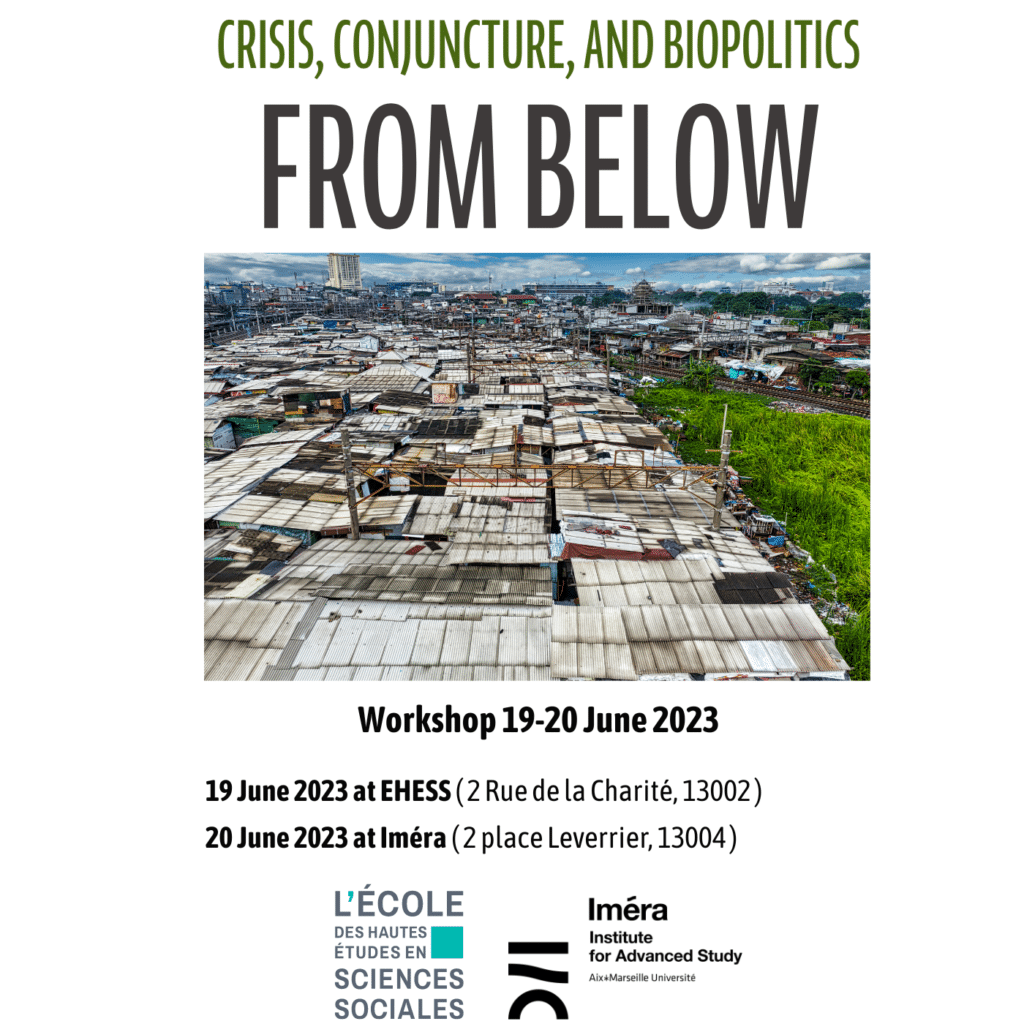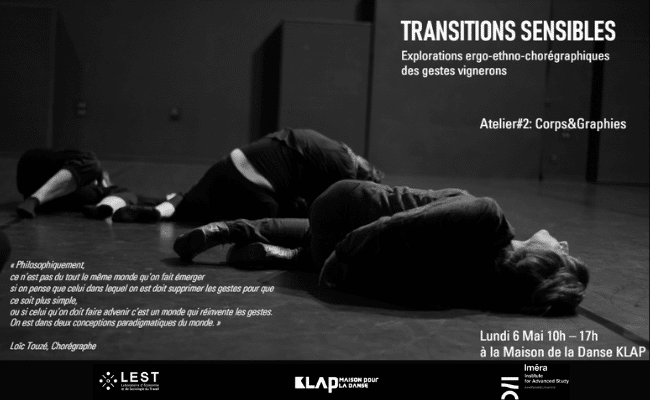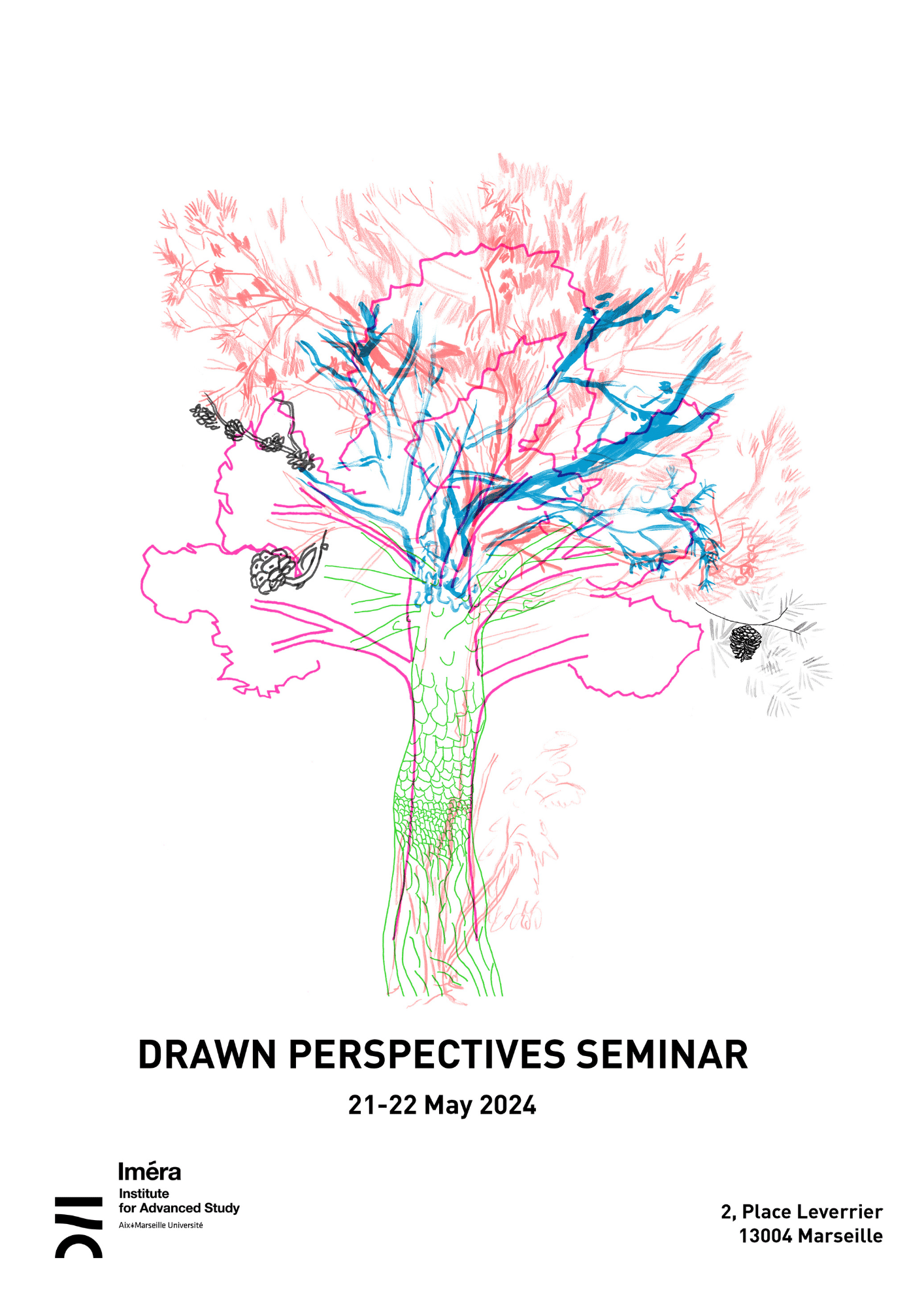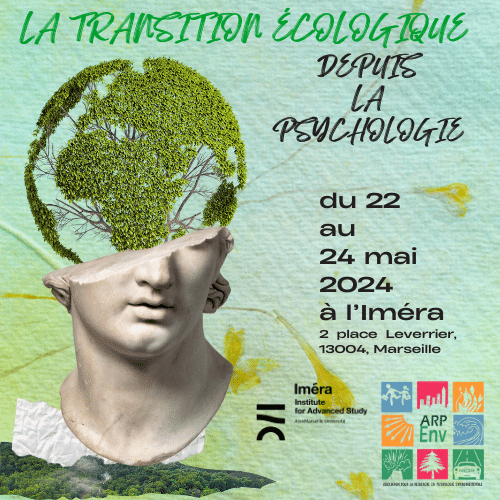On June 19 anf 20, Ranabir Samaddar, Distinguished Chair in Migration and Forced Migration Studies at the Calcutta Research Group and holder of the EHESS/Iméra Chair in Transregional Studies (2022-23) organizes a 2-days workshop on Crisis, Conjuncture, and Biopolitics from Below.

Workshop on Crisis, Conjuncture, and Biopolitics from Below
19 June at EHESS (2 rue de la Charité, 13002)
20 June at Iméra (2 place Leverrier, 13004)
A theory of crisis is not enough to make sense of the current disorder and anarchy, which already looks like a condition of chaos. In this background it is important to think in terms of the correlation of forces at the time of a crisis, the conjuncture of events and forces, the simultaneity or near simultaneity of events, hence the way contention materialises, and the resultant situation of rupture. The theme of crisis and conjuncture helps us to better understand the contemporary history of colonial and postcolonial contentions as well as certain narratives from the modern past when capitalism originated.
These narratives tell us of (a) the political responses of the lower classes when capitalism began, which Marx termed as “primitive accumulation”, (b) the particular constellation of revolts in the colonial time, particularly in the phase known as decolonisation, and finally, (c) how “people” emerge as a modern governmental category in the postcolonial time. Against this background of crisis and conjuncture, we are now witness to a phenomenon that is at the heart of the question around crisis in the liberal procedure of governing.
It is the phenomenon of “biopolitics from below,” which can be understood and historically situated only in the context of a crisis and a moment of conjuncture. Governing life with various procedures appears in the history of rule as a central repository of experiences of governance and statecraft. Life must be productive and governments can function based on stable life. Yet, what happens when life faces a crisis, as in many parts of the world where conditions of life appear as unstable? Such conditions, we shall see, may produce an unanticipated politics of life.
Based on Indian experiences, this workshop aims to explore the question of biopolitics from below in the context of governments caught in crises, particularly in the neoliberal time. The presentation will revolve around two themes: (a) the specific context of a multiple crises – the recent epidemiological crisis, financial crisis, and political crisis leading to a crisis of life, and (b) as a response to this conjuncture, the phenomenon of “biopolitics from below.” It will show why only in specific moments of crisis and conjuncture, biopolitics from below materialises as a phenomenon.
Biopolitics from below reconfigures our notions of care, protection, responsibility and solidarity. Traces of such politics momentarily appearing in the wake of a crisis may appear as utopias, but they are to use an odd phrase, “necessary utopias.”
Day I / 19 June (2-6 pm) / Venue: salle C, EHESS (2 rue de la Charite, 13002)
Welcome note and introduction to the workshop – Valeria Siniscalchi (Antropologist, EHESS, Centre Norbert Elias)
Speakers:
- Ranabir Samaddar (Imera-EHESS Chair in “Necessary Utopias” Programme and Distingushed Chair in Migration and Forced Migration Studies, Calcutta Research Group, Kolkata), Conjuncture and Biopolitics from Below
- Paula Banerjee (IDRC Chair on Gender and Forced Displacement, Asian Institute of Technology, Bangkok), Human Trafficking, Borders and Biopolitics from Below
Discussant: Miriam Teschl (Philosopher and Economist, EHESS, Aix-Marseille School of Economics) - Sabyasachi Basu Ray Chaudhury (Professor, Political Science, Rabindra Bharati University, Kolkata, and Honorary Director, Calcutta Research Group), The Anatomy of a “Crisis”: Refugees from Bengal in the Andaman Islands
Discussant: Judith Scheele (Anthopologist, EHESS, Centre Norbert Elias) - General discussion
Day II / 20 June (2-6 pm) / Venue: Iméra (2 place Leverrier, 13004)
Welcome note and introduction to the workshop – Enrico Donaggio (Philosopher, scientific director of Iméra)
- Panagiotis Sotiris (Philosopher and journalist, teaches at the Hellenic Open University, Athens, and a member of the Historical Materialism editorial board), Rethinking Biopolitics from Below
Discussant: Marie-Aude Fouéré (Anthopologist, EHESS, IMAF) - Samita Sen (Vere Harmsworth Professor in Imperial and Naval History, University of Cambridge, Cambridge), Politics of Home and Work: Migration and Informality in India
Discussant: Davide Cacchioni (Anthopologist, EHESS, Centre Norbert Elias - Livio Boni (Psychoanalyst, author of Freud and the Archaeological Question, 2014, and co-author, Post-colonial Cities in India, 2017), A Wider Materialism? The (in)actuality on Gandhian biopolitics
Discussant: Eloi Ficquet (Anthropologist and Historian, EHESS, CeSOR) - Concluding remarks
Ranabir Samaddar is the holder of the EHESS/Iméra Chair in Transregional Studies (2022-23). His research project at Iméra, the Institute for Advanced Study (IAS) of Aix-Marseille University “Biopolitics from Below, a New Model of Power, and a Different Politics of Life” aims to argue that, moments of crisis, such as war, a famine, or an epidemic, occasion bio-politics from below. The question of life comes to occupy the centre stage of the politics of the lower classes. The emergence of bio-politics from below is thus contingent on moments of crisis.
Ranabir Samaddar – Conjuncture and Biopolitics from Below
A theory of crisis is not enough to make sense of the current disorder and anarchy, which already looks like a condition of chaos. In this background it is important to think in terms of the correlation of forces at the time of a crisis, the conjuncture of events and forces, the simultaneity or near simultaneity of events, hence the way contention materialises, and the resultant situation of rupture. Against this background of crisis and conjuncture, we are now witness to a phenomenon that is at the heart of the question around crisis in the liberal procedure of governing. It is the phenomenon of “biopolitics from below,” which can be understood and historically situated only in the context of a crisis and a moment of conjuncture. Governing life with various procedures appears in the history of rule as a central repository of experiences of governance and statecraft. Life must be productive and governments can function based on stable life. Yet, what happens when life faces a crisis, as in many parts of the world where conditions of life appear as unstable? Such conditions, we shall see, may produce an unanticipated politics of life. Based on Indian experiences, this talk aims to explore the question of biopolitics from below in the context of governments caught in crises, particularly in the neoliberal time. The presentation will revolve around two themes: (a) the specific context of a multiple crises – the recent epidemiological crisis, financial crisis, and political crisis leading to a crisis of life, and (b) as a response to this conjuncture, the phenomenon of “biopolitics from below.” Biopolitics from below reconfigures our notions of care, protection, responsibility and solidarity. Traces of such politics momentarily appearing in the wake of a crisis may appear as utopias, but they are to use an odd phrase, “necessary utopias.”
Paula Banerjee – Human Trafficking, Borders, and Biopolitics from Below
Nearly 230 million Indians have fallen below the poverty line since the COVID-19 pandemic began. Also, it is a sad fact that vulnerable, desperate people attract predators. Between April 2020 and June 2021, more than 9000 children were rescued from human traffickers. Strict pandemic lockdowns followed by the devastation of cyclone Amphan in coastal Bengal in 2020 left girls highly vulnerable to traffickers. But there is more to the story: Indian girls and women often have few rights and protections even before they are trafficked. Experts say they frequently see trafficking as their way out of poverty and into a life of at least some agency. The poverty-stricken Sundarban areas of Bengal, where cyclone Amphan hit hardest, have become hot spots for trafficking in women and girls, according to a report in The Hindu. Cut off from legal aid because of damaged road and telecommunications infrastructure, these areas have seen an alarming spike in human trafficking.
Feminist activists, at least some, who provide support to the children of sex workers and work on safe migration of girls particularly from plantation areas, refuse to accept the narrative of victimhood in relation to increased trafficking of girls from the plantations. They hold that it is wrong to think that the girls were unaware of the issues related to trafficking. The trafficked are not pure victims and traffickers to them are not predators. The situation presents the trafficked girls and women a path to a world where they can perhaps escape their poverty and live their lives. For many of the girls and women this is their conscious choice. That is why even when they are apprehended by police they do not accuse their traffickers or make them responsible for their legal situation.
Trafficking is always a product of crisis. Lives caught up in the web of trafficking are products of a conjuncture of events that appears in a crisis mode. It would be incorrect to think that people caught up in trafficking are all victims. The victim narrative might be a construction for a certain purpose. Perhaps this entire situation is an example of biopolitics from below.
Sabyasachi Basu Ray Chaudhury – The Anatomy of a ‘Crisis’: Refugees from Bengal in the Andaman Islands
Was India’s partition in 1947 a crisis? Millions of the people living in the subcontinent, were uprooted from their traditional homeland, and were compel to be resettled in an unknown territory as a consequence of the partition, over and above the loss of lives of a huge number of men, women and children and barbarous torture of many more. A number of the refugees, mainly Namasudras, belonging to the so-called lower castes in India, were sent to the Andaman Islands in the Bay of Bengal, separated from the Indian mainland by a distance of about 1200 kilometres. Those remote islands had been hitherto used by the British colonial rulers as penal settlement since the late 19th century. The original inhabitants of these islands were a few indigenous groups who are considered far away from the modern civilization. Crossing the kalapani (black water) of Bay of Bengal was considered to be a voyage of no return. The reluctant refugees resettled there also hardly had any option to come back to the mainland as the only transport available in those days were ships operated by the state-owned Shipping Corporation of India.
Initially after being sent there, the refugees used to grumble in a futile manner mainly among themselves about the inadequacy of many basic amenities available in the transit camps in mainland India. The almost total disconnect from their kith and kin alienated the refugees to such an extent that this final resettlement was viewed as a punitive measure. However, while they had to reconcile to this new situation, did they take this ‘crisis’ for granted? Was it a ‘crisis’ for them? Did they take the gravity of the emerging situation as ‘crisis’?
In this paper, we shall attempt to displace the existing analysis of the ‘crisis’ of partition, on which most studies have focused so far, and shall try to understand the perceptions generated among the resettled refugees of the Andamans as response to the specific situation known as the Partition.
Panagiotis Sotiris – Rethinking Biopolitics from Below
The pandemic was a major social and political challenge. In its handling one could see the tension between an authoritarian disciplinary and coercive approach, that in many aspects proved ineffective, and a very cynical neoliberal “business as usual” and “do nothing” approach. What has been missing is a radical democratic and transformative approach that would stress the importance of collective practices of solidarity, insist on grassroots networks of support and aim at a dialogic adaptation of forms of social interaction to the exigencies that the pandemic posed. Such a challenge poses the question whether we can think of a democratic biopolitics or a biopolitics from below. The aim of this presentation will be to return to these questions by means of a return to the debates around the social determinants of health and the research on the social production of disease and vulnerability, along with a return to a conception of transformative politics as collective experimentation and ingenuity and a re-reading of later Foucault.
Some references:
Panagiotis Sotiris, “Is a Communist Governmentality Possible? Parrhēsia, Care of the Self, and the Possibility of Another Life”, The South Atlantic Quarterly, October 2022
Panagiotis Sotiris, “Thinking Beyond the Lockdown: On the Possibility of a Democratic Biopolitics”, Historical Materialism, 28 (3), 2020
Richard Wilkinson, Unhealthy Societies: The Afflictions of Inequality, London: Routledge, 1996
Samita Sen – Politics of Home and Work: Migration and Informality in India
In India, with the announcement of an indefinite lockdown in March 2020, we witnessed an unparalleled migrant crisis. Some scholars and publicists wrote, even as the crisis unfolded, that the inhospitable city was ejecting the migrant, that this would result in a radical loss of trust and these migrants would never return to the city. In fact, even before the ink dried, as soon as transport became available, reverse migration reversed again. Now, three years down the road, with the pandemic receding, it is as though the migrant crisis of March-May 2022 had never been. Such a swift change was possible because the crisis merely enhanced processes already well-entrenched—mobility has been a critical aspect of poverty for nearly two centuries.
In my presentation I will draw on this context to discuss the specific crisis in paid domestic work during the pandemic, what the crisis revealed about the structure and organisation of this occupation and some of the portents for the future.
Livio Boni – A Wider Materialism? The (in)actuality on Gandhian biopolitics
Moving from recent materialistic readings of Gandhian thinking and practice, as for example the one by Joseph Alter (“Gandhi’s Body, Gandhi’s Truth”: Nonviolence and the Biomoral Imperative of Public Health”, The Journal of Asian Studies, 55: 2, May 1996, 301-322), based on the notion of “biomorality”, or the proposition by Shaj Mohan and Divya Dwivedi, concerning the Gandhian “hypophysics” (Gandhi and Philosophy: On Theological Anti-Politics, London: Bloomsbury, 2019), we shall try to interrogate the possibility of an actualization of some Gandhian skills, and their capacity to articulate the technologies of the Self, political action and a philosophy of Nature.
Some references :
“Comment décoloniser un corps? Notes sur le cas gandhien” (http://www.collectifdepantin.org/posts/comment-decoloniser-un-corps-notes-sur-les-cas-gandhien) “Le gandhisme à l’épreuve de la psychanalyse (1). Jalons pour une lecture matérialiste” (http://www.collectifdepantin.org/posts/introduction-jalons-pour-une-lecture-materialiste-du-gandhisme



